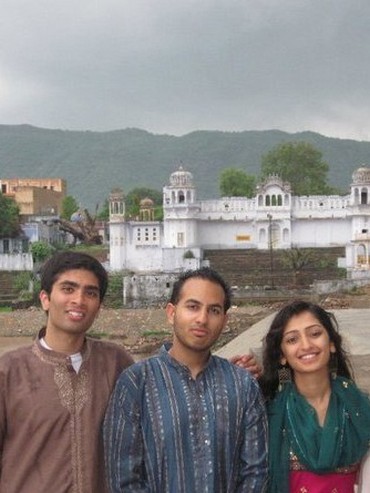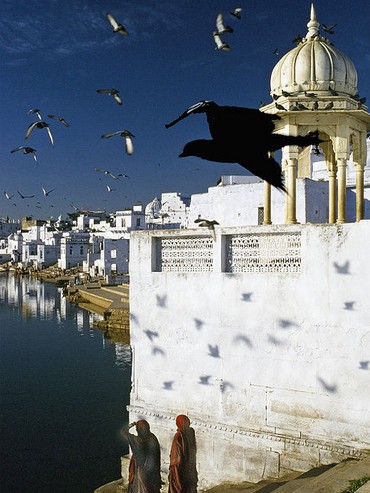
As part of an ongoing series, we bring you stories of young Indian Americans who came looking for the Real India and found their real selves instead. Punal Bhavsar recounts his trip to India.
Punal Bhavsar is a native of Pleasanton, California, and a graduate of University of California, Berkeley, where he obtained his degree in environmental science. At school, he was involved in research with plants that removed boron from the soil. He is working towards his arangetram in Bharata Naytam, while working as a tutor. He hopes to create a company that deals with microfinance loans:
Growing up in California, I was given everything I could ever ask for. I grew up in an extremely affluent town surrounded by beautiful fertile hills and thriving wineries. Saying I was sheltered would be an understatement. It wasn't until I was in college that I broke free of my protected lifestyle and realised how privileged my hometown and childhood was.
The first year of college, my parents took me to their home state, Gujarat, to show me how privileged I was. However, their methods were often oxymoronic. Intending to teach me a lesson, my dad took me to see the slums; there, I was blinded to what was around me, for I was comfortably driving around in a chauffeur-driven, air-conditioned SUV.
He also tried to instill this notion by pointing to the unreliable power and water supply. However, these incidences occurred in posh malls or relatives' mansions. He underscored the idea that America is a privileged country, and that the countless advantages of the country make its citizens fortunate to live in it.
Yet simultaneously, he explained that India is the land of his childhood, as Pleasanton is the land of mine. He would reminisce about the activities he indulged in, the miles he walked, the sights and smells he experienced. However, I never truly understood how my parents grew up.
It was because of these sugarcoated trips to India that I never understood my dad's pride in his heritage and the emphasis he put on the importance of being Indian.
Every experience I had in India was simply a vacation of indulgence. I never took anything back except the myriad of pictures of happy relatives and tourist sites.
It wasn't until the Bharat Yatra that this changed.
With the limited time in Rajasthan, all the sites we visited seemed to blur together; however, one experience that stands out in my mind is the day I spent in Pushkar. It was a place of harmonious fluidity, built from both Western and Eastern influences.
The architectural standards and omnipresent cell phone usage reminded me of the Western world; the pervasiveness of the temples, sanctified lake banks, and the frequent recitation of sacred Hindu chants gave the city an Eastern vibe.
Some may claim that the monsoon rain marred our visit to Pushkar; I would disagree. It was the heavy downpours that made Pushkar so assertively memorable.

Though it rained only an hour, the streets leading to Pushkar Lake were filled with muddy, flowing water. It was a great desire to see the holy Pushkar Lake that motivated us to continue. As we carefully waded in our rolled up kurta paijamas and lehengas, we were forced to step out of our comfort zones and rely on our senses to make it to the lake.
The people took no notice of the rain or us, and hurried along to complete their daily activities. It gave us an opportunity to take a closer look at the culture this city offers.
We took in simple aspects of the city -- the pilgrim shops, the side street bazaars, the aromas of food stalls and fragrance of thousands of burning incense sticks, the sounds of priests reciting holy rituals, and the yelling of store owners.
Though it was chaotic and hectic, it all seemed serene to me, for I understood the significance of the intertwining relationship of Pushkar's culture, religion and lifestyles: It is inherently natural.
It was at that moment, while I was walking in the rain through a crowded street surrounded by unpleasant sounds that I realised that I was in my element.
While this scene did not necessarily mirror the India of my father's childhood, it emulated one aspect of it. Every single subsequent experience of Bharat Yatra allowed me to appreciate my father's memories, and my heritage. I was no longer in my parents' India; this was MY India.
Our time in India was not only about experiencing Rajasthan's cultural heritage. Bharat Yatra allowed me to interact with the people and see the positive and negative interactions of communities and groups at a micro level.
For example, a highlight of my Jaipur visit was my visit to the Jaipur Foot organisation, which brought me in touch with a group I would never have interacted with in India: People with disabilities.
It is these interactions that allowed me to realise that I can do so much more with my life. For the first time, I took more than just pictures back with me to America: I took the motivation to improve the life of others.
I have already acted on this drive. I became part of a Hindi film dance group that performs at charity events. As a Bharata Natyam dancer, I am preparing for my arangetram, and perform at charity events in order to practice for my own debut.
Simultaneously, I will be helping put together a dance performance exploring women's issues. This performance will use dance as a medium to explore topics like domestic violence, widowhood, healthy body image and celebrate women around the world.
Finally, having studied environmental science, I have an enhanced awareness of the health of the environment. I have made it a career goal to start a microfinance institution that provides loans to individuals interested in contributing to the green sector in Third World countries.